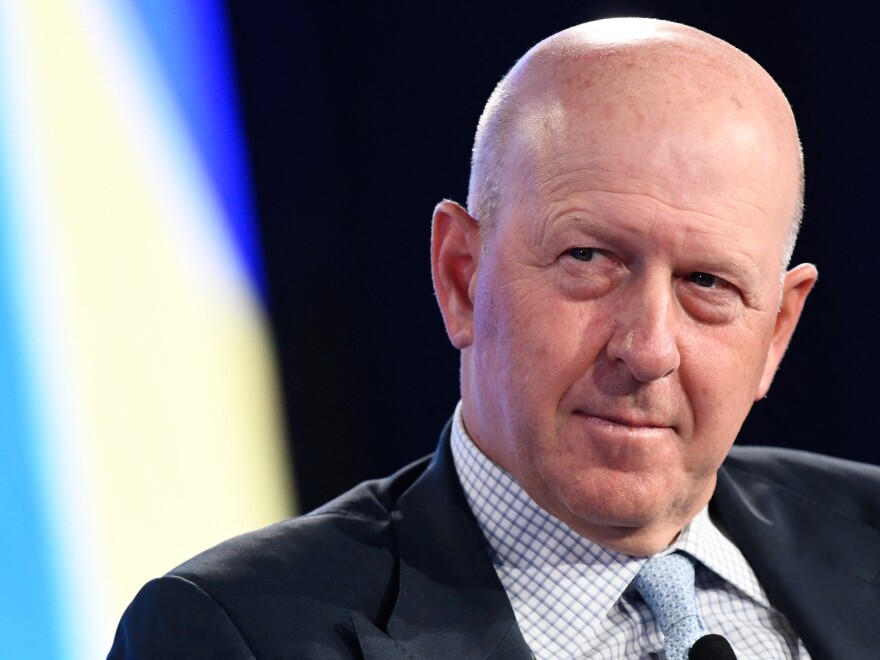A few days before Goldman Sachs laid off more than 3,000 employees, Emma Alexander and her coworkers were feeling nervous.
News that the layoffs were coming had already leaked, and anxiety across Goldman's global offices was high.
Then, Alexander got a message from her boss, asking her to come to the conference room.
"And I was like, OK, great," she recalls. "I guess it's me. I guess it's happening right now."
Twenty minutes after meeting her boss, Alexander turned in her badge, and she left her office in Dallas for the last time.
She'd been swept up in the largest round of job cuts at Goldman since the Global Financial Crisis. The storied bank laid off more than 3,000 staff last month.
The high pace in Wall Street
It wasn't Alexander's dream to work in banking. She was a sociology major, who has a master's degree in public policy.
Alexander says she took the first job she could get after graduating in 2020, just when the pandemic was starting to spread. But she grew to love finance's fast-paced and competitive culture.
For Alexander, getting cut was a rude introduction to another reality of Wall Street life: layoffs.
Few sectors are more prone to layoffs than finance, where a bad year in the markets — or a lousy performance review — can mean you are out of a job.
According to a 2021 report from the Office of the New York State Comptroller, the securities industry has experienced job losses in 13 of the past 30 years when data is available, or nearly once every two years.
When your job is hitched to how markets perform

Getting cut is part of an understood but unwritten rule, according to Wall Street employees: The pay is high — a first-year associate at Goldman, for instance, makes more than $150,000 a year, not including a bonus — but with that compensation, comes the understanding that getting cut is an ever present risk.
"It always happens," says David Stowell, a professor of finance at Northwestern University, who spent most of his career at Goldman. "There is expected to be some cuts every single year at most Wall Street firms."
Still, Goldman's layoffs were unusually large this year.
Because of high prices, rising interest rates, and economic uncertainty, many of Goldman's corporate clients have been sitting on the sidelines, and as a result, profits at the Wall Street firm have dropped dramatically.
The performance of financial firms is linked heavily to how markets perform, as is the fate of its staff. It's a reality on Wall Street that can be frustrating when it comes to layoffs.
"The financial markets are unpredictable and cyclical," Stowell says. "So, you live and die with the markets."
The performance review

But the bigger-than-usual layoffs announced by Goldman this year also marked another facet of Wall Street life that has returned: annual performance reviews.
In Wall Street, they are are notoriously exhaustive and consequential. Not only are these assessments used to determine the size of your bonus, but also, whether you will keep your job.
Every year, bankers are evaluated by their peers, bosses, and subordinates. The firm measures how much money they brought in, and how well they worked with their teammates.
Underperformers are regularly let go. It makes the performance review an extremely powerful tool for management, according to Stowell.
"In my experience, a little fear is good," he says. "It motivates you to do better."
It still stings

The prospect of getting cut may be something employees live with, but when it happens, it still stings.
John Gooden learned that lesson in 2016, when he was a second-year associate at Bank of America.
One September, on his commute to the office, he learned that his firm had started layoffs. A few hours later, Gooden met the same fate.
"I was completely caught off guard," he says. "It kind of knocked the wind out of me, and I didn't really know what to do."
Gooden remembers staggering around the office, and saying goodbye to a few members of his team. He did some soul-searching. Then, Gooden started calling his contacts, and sending out copies of resume.
"After you kind of lick your wounds a bit, you've got to get back to it," he says. "Especially me. I had a family to support."
Gooden got back on his feet, and six years later, he is still working on Wall Street.
Bouncing back

Alexander also remembers being "in a state of shock" after her supervisor told her she was being let go.
"I took it pretty hard," she says. "I was pretty upset."
Alexander estimates the entire ordeal lasted about 20 minutes. She had a brief meeting with her team, and then, she was escorted out of the building. Alexander didn't have time to finish up emails she was writing, and she wasn't able to hand off work in progress.
The next few days were difficult, she says. Today, she is applying for jobs in finance, mulling over what could come next.
"I'm in it now, and I love it," she says. "But I'm also wondering if maybe I should be taking some time and thinking about going back and doing something that maybe I studied for, and went to school for."
Today, Alexander is still looking for work — open to the possibility it may not be on Wall Street.
Copyright 2023 NPR. To see more, visit https://www.npr.org.



